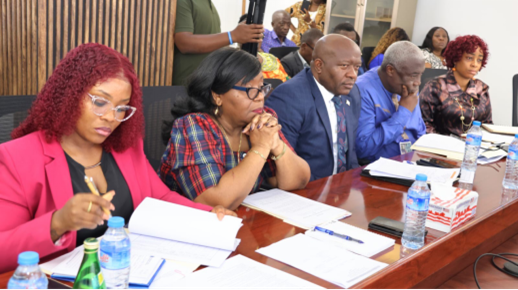The Government of Liberia embarked on a critical phase of its fiscal planning process with the commencement of Executive Budget Hearings for Fiscal Year 2026. Headed by the Ministry of Finance and Development Planning (MFDP), these hearings serve as a vital platform for ministries, agencies, and commissions (MACs) to present their budgetary proposals and justify their resource needs for the upcoming fiscal year. This consultative process is mandated by law, ensuring transparency and alignment between government spending and national priorities. The initial round of hearings witnessed presentations from key institutions in the agricultural and economic sectors, setting the stage for a comprehensive review of the government’s projected expenditures.
Minister of Finance and Development Planning, Augustine Kpehe Ngafuan, emphasized the significance of these hearings, highlighting the legal obligation of the Ministry to submit the national budget by October 31st. He stressed that the hearings are not merely a formality but a crucial mechanism for gathering input from spending entities, addressing their concerns, and ultimately shaping a budget that reflects national priorities. Minister Ngafuan underscored the meticulous and consultative nature of the budget allocation process, assuring that resource allocation is based on a thorough assessment of institutional needs and strategic priorities, aiming for both efficiency and effectiveness in public spending.
The Minister further reiterated the government’s commitment to its five-year development framework, the Agenda for Inclusive Development (AAID), which serves as the guiding document for the budget formulation process. The AAID outlines specific targets and objectives for improving public sector performance and service delivery across key sectors, ensuring that the national budget aligns with the broader development vision of the country. This framework provides a roadmap for achieving sustainable and inclusive growth, and the budget hearings play a crucial role in translating the AAID’s aspirations into concrete financial allocations.
Looking ahead to FY2026, Minister Ngafuan projected an increase in the national budget compared to the previous year’s $738 million. While acknowledging the ambitious nature of the proposals submitted by various spending entities, he emphasized the need to reconcile these requests with available fiscal space. The Ministry is working closely with the Liberia Revenue Authority (LRA) and other stakeholders to enhance revenue generation and resource mobilization, ensuring that the government has the financial capacity to support its development agenda. This collaborative approach recognizes the importance of balancing budgetary aspirations with realistic revenue projections.
Minister Ngafuan commended the Ministry of Agriculture for its proactive approach in developing a comprehensive National Agricultural Development Plan even before the launch of the AAID. He emphasized that such forward-thinking planning is instrumental in aligning sectoral priorities with the nation’s overarching development goals. He encouraged all participating institutions to be forthright in presenting their budgetary needs, assuring them that the Ministry is receptive to ambitious proposals despite the ever-present challenge of resource constraints. This openness to bold proposals reflects the government’s commitment to investing in key sectors and driving progress towards its development objectives.
Assistant Minister for Budget and Development Planning, Sarah McGill Mulbah, reiterated that the budget hearings are being conducted in strict adherence to the Public Financial Management (PFM) Law. This underscores the government’s commitment to transparency and accountability in its fiscal management practices. The PFM Law provides a robust framework for the budget formulation process, ensuring that public resources are allocated and managed effectively and efficiently. The meticulous adherence to this legal framework demonstrates the government’s dedication to responsible financial stewardship. The budget hearings, therefore, are not just an annual exercise but a vital component of a broader system designed to promote sound public financial management and ultimately contribute to national development.














